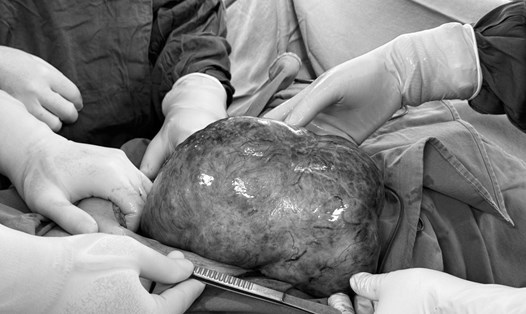On July 17, 108 Central Military Hospital said that the unit had just received an emergency care for a 66-year-old female patient from Hanoi who had been hospitalized with abdominal pain for 3 days and was in slow contact. Notably, the patient had a history of ovarian cancer that was discovered many years ago but did not intervene due to many complex underlying diseases such as: Old stroke (recently taking anticoagulants), high blood pressure, diabetes that was not well controlled, and dementia.
At the 108 Central Military Hospital, after a clinical examination, the doctor noted that the abdomen showed signs of a reaction to the abdominal wall, showing suspicious signs of abdominal infection. Tests and imaging diagnosis showed: a bleeding ovarian tumor suspected to be caused by torsion.
Immediately after a quick consultation with the multidisciplinary team, the patient was indicated for emergency surgery. After surgery, the doctors removed a large left ovarian tumor (15cm, weighing about 5kg). The U had turned 3 times at the fallopian tubes, turning purple and necrotic. The surgical team completely removed the necrotizing secondary part, helping to prevent the risk of infection from spreading and threatening life. After 5 days of treatment and intensive care, the patient was stable and discharged from the hospital.
Colonel, BSCKII Tran Thanh Huong - Head of the Obstetrics and Gynecology Department, 108 Central Military Hospital, said that the manifestations and complications of a giant ovarian tumor include: pressing into the bladder causing frequent urination or difficulty urinating; pressing into the urethra causing renal water stasis; pressing into the rectum causing constipation; pressing into the arteries - veins of the abdomen, increasing abdominal pressure causing difficulty breathing, pain, poor appetite, thinness, ... affecting the quality of life and reproductive quality.
Ovarian tumors are also at risk of developing a ruptured tumor, which can cause bleeding, abdominal overflow, peritoneal inflammation, and a torsioned ovarian tumor that stops blood circulation to the ovaries, leading to anemia in the blood vessels, causing necrosis. More dangerous at that time is a malignant ovarian tumor, detected late, leading to remote metastasis, affecting life.
Ovarian Uses can occur at any age, from children to the elderly. Especially for postmenopausal women who discover ovarian tumors, be very careful because the risk of malignant ovarian tumors is high.
Dr. Tran Thanh Huong recommends: Women should go for a gynecological check-up every 6 months to detect gynecological diseases early, especially ovarian tumors, the disease can progress silently but the consequences are very serious if left late. Early diagnosis and treatment will help minimize complications and preserve reproductive health as well as life.







